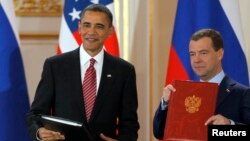俄罗斯星期一面临遵守削减战略武器条约最后期限
美国认为,俄罗斯将在星期一的最后期限之前遵守两国签署的削减战略武器条约。
美国国务院发言人诺尔特说,美国2017年8月满足了新削减战略武器条约的条件,俄罗斯也朝同一方向去的了进展,因此美国没有理由认为俄罗斯将不会满足条约的规定。
国务院在星期天的声明中说,两国将在下个月之前交换各自和武器库的有关数据,并且在过去7年以来每年都进行两次数据交换。
新的削减战略武器条约2010年4月8号签署,2011年2月5号正式生效。
条约规定,美国和俄罗斯的战略核弹头总数不能超过1550,同时还限制已部署和未部署的洲际弹道导弹、远程战略轰炸机和可用潜艇发射的导弹的数量。
US, Russia Face Deadline for Nuclear Arsenal Reduction
The United States believes that Russia will honor its commitments under the bilateral Strategic Arms Reduction Treaty (New START) by the Monday deadline.
“The United States has met the central limits of the New Start treaty in August 2017. We assess at this time that Russia has also progressed toward meeting those limits. We have no reason to believe that the Russian government will not meet those limits as well," U.S. State Department spokesperson Heather Nauert said.
The State Department said in a release late Sunday that both countries will exchange data on their respective nuclear arsenals "within the next month, as we have done twice per year over the last seven years in accordance with the Treaty."
The New START Treaty was signed in Prague on April 8, 2010 and came into force on February 5, 2011.
It limits the U.S. and Russia to no more than 1,550 nuclear warheads and also limits deployed and non-deployed intercontinental ballistic missiles, heavy bombers and submarine-launched ballistic missiles.
美日澳印决意维护南中国海自由航行
分析人士说,决意维护南中国海自由国际航行的四个大国很可能将发表措辞严厉的声明、帮助在海洋主权上与中国对立的国家,并将于今年在有主权争议的海域附近举行联合军事演习。
澳大利亚、印度、日本和美国很可能会采取以上措施,而不是直接挑战中国的主权声索,比如它在南中国海500个岛屿的一些有主权争议岛屿上建立军事设施的行为。
这四个国家希望在维护它们与中国的经济关系的同时,保持在350万平方公里的南中国海上的自由航行。
Four Powerful Countries Plan Resistance To China in a Disputed Asian Sea
A bloc of four powerful, Western-allied nations, intent on keeping the South China Sea open for international use despite growing Chinese control, will probably issue stern statements, help China’s maritime rivals and hold joint naval exercises near the contested waterway this year, analysts say.
Australia, India, Japan and the United States, a group known as the quad, are most likely to take those measures rather than directly challenging Chinese claims such as its military installations among the sea’s 500 small islets.
The quad countries want to keep the 3.5 million-square-kilometer, resource-rich sea open while protecting their own economic ties with Beijing.







